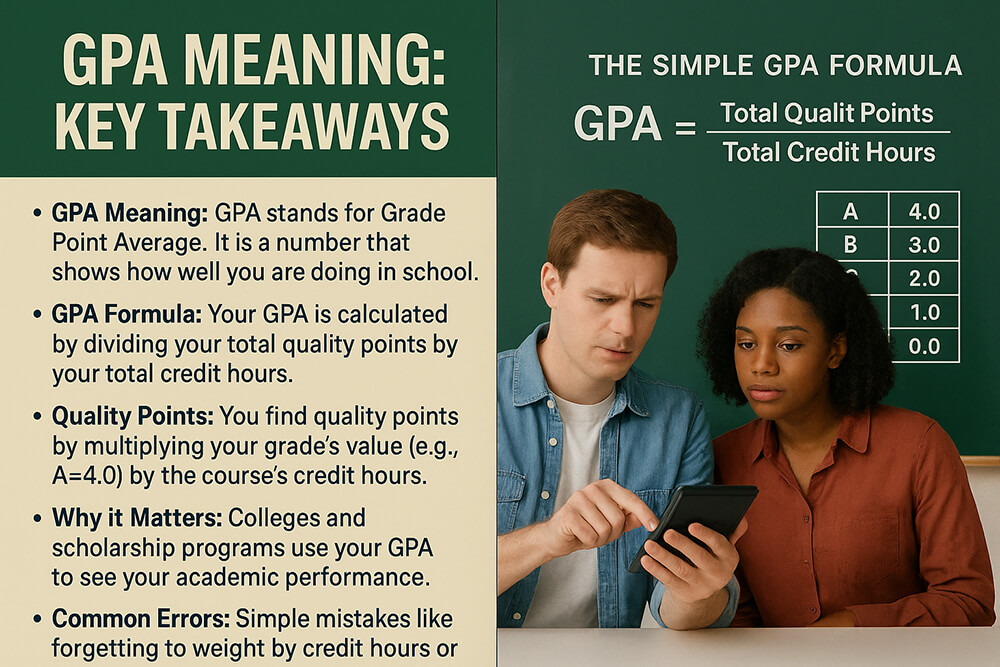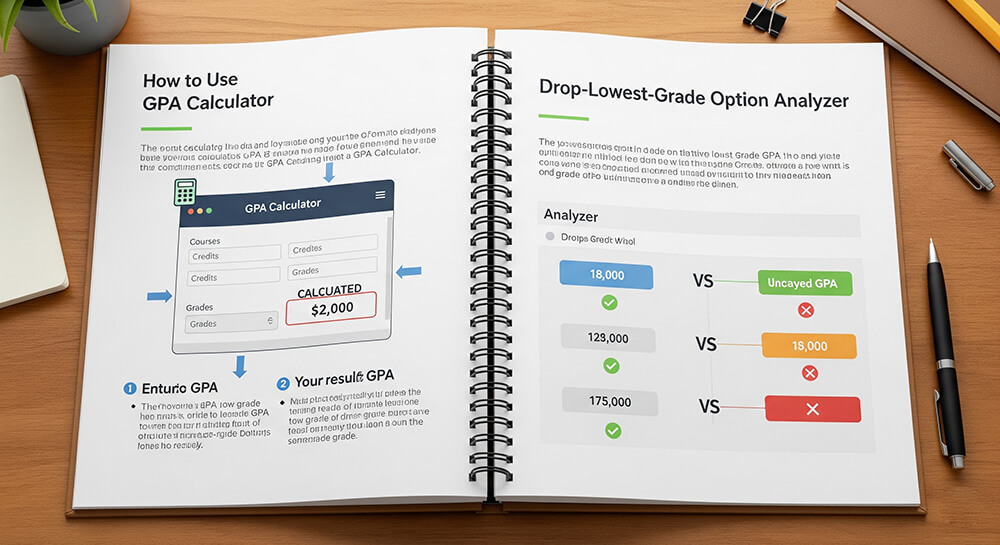Key Takeaways
| Concept | Key Insight | Recommendation |
|---|---|---|
| ROI Timing | Retaking a course early in your college career (under 60 credits) has the biggest impact on your GPA. | Prioritize retaking failed prerequisite courses during your freshman or sophomore year for maximum benefit. |
| Policy Matters | Your school's policy is crucial. "Full Grade Replacement" offers the most benefit, while "Grade Averaging" cuts the potential GPA boost in half. | Always check your student handbook or meet with an advisor to confirm your school's specific grade forgiveness policy before enrolling. |
| The Math | The GPA gain from a retake shrinks as you complete more credits. A retake might raise a freshman's GPA by +0.40 but only +0.06 for a senior. | Use a Repeat Course GPA Recalculator to see the exact impact before you commit time and money to a retake. |
| Alternatives | Sometimes, taking a new class and earning an 'A' is a better strategy than retaking a course where you earned a 'C'. | If you are late in your academic career (90+ credits), focus on excelling in new, high-credit courses to improve your GPA. |
| Graduate School | Many graduate and professional schools recalculate your GPA using all grades, even those your undergrad institution replaced. | Do not assume a retake will erase a bad grade from your record for future applications. Focus on building a strong overall academic history. |
Understanding Grade Replacement and Your GPA
Deciding to retake a course is a big step. It involves time, effort, and money. A Grade-Replacement ROI Calculator helps you make a smart choice. It uses math to show how a new grade will change your overall Grade Point Average (GPA). This tool turns a guess into a clear plan.
Your GPA is a simple average. It is the total of your quality points divided by the total of your credit hours. When you retake a course, the new grade can change this calculation. Understanding the basic GPA formula is the first step. This knowledge helps you see exactly how retaking a class can help you.
How Different Schools Handle Retakes
Not all schools treat retakes the same way. Their rules greatly affect your GPA. There are three main types of policies.
- Full Grade Replacement: The new grade completely replaces the old one in your GPA calculation. This is the best for students.
- Grade Averaging: The old and new grades are averaged together. This lessens the positive impact on your GPA.
- Limited Forgiveness: Schools give you a set number of credits (like 12 or 16) where you can replace a grade. After you use these credits, any other retakes will be averaged.
It is very important to know your school's rules. You can find this information in your student handbook or by talking to an academic advisor. This is also important if you plan to move schools; a transfer credits GPA integrator can help you see how grades might change.
The Math Behind Your Grade-Replacement ROI
Calculating the return on investment (ROI) for a retake is straightforward. You need to see how the new quality points will change your cumulative GPA. The formula looks like this:
New GPA = (Current Quality Points - Old Grade's Points + New Grade's Points) / Total Credit Hours
Let's look at an example. A student has a 2.5 GPA with 30 credit hours. They failed a 4-credit class (0 points). They retake it and get a 'B' (3.0 grade points, which equals 12 quality points). Their new GPA becomes 2.90. That is a big jump. However, for a student with 90 credits, the same change might only lift their GPA by a small amount, like 0.06 points. A college GPA calculator can do this math for you quickly.
When Retaking a Course Is a Good Idea (High ROI)
Retaking a course offers a high return on investment in specific situations. The best time to retake a class is early in your academic journey, like in your first year. A freshman year GPA predictor can show how impactful early grades are.
You should strongly consider a retake if:
- You have completed fewer than 60 credits.
- The original grade was a 'D' or 'F'.
- The course is a required prerequisite for your major. A prerequisite-only GPA calculator can highlight the importance of these grades.
- Your school uses a full grade replacement policy.
- You have a clear plan to do much better the second time.
When You Should Avoid Retaking a Course (Low ROI)
Sometimes, retaking a course is not the best use of your time. The impact on your GPA is very small when you have already completed many credits. For example, using a last 60 credits GPA calculator might show that recent grades are more important for some purposes.
You should look for other options if:
- You have more than 90 credits completed.
- Your original grade was a 'C' or better.
- Your school averages the two grades instead of replacing the old one.
- The course is an elective and not central to your field of study. A tool to compare core vs. elective GPA can put this in perspective.
- The time could be better spent on an internship or a new, advanced course.
A Step-by-Step Guide to Your Decision
Making a data-driven decision is key. Follow these steps to see if retaking a course is right for you.
- Gather Your Data: Get your official transcript. You will need your current GPA and total credit hours. A transcript GPA audit guide can help you understand all the details.
- Know the Policy: Find your school's official grade forgiveness policy. Check for any limits on retakes.
- Project Your New Grade: Be honest about what grade you can earn. A better grade often requires better study habits. A study habit audit checklist can provide a clear path for improvement.
- Calculate the Impact: Use the ROI formula or a repeat course GPA recalculator to see the potential GPA change.
- Talk to an Advisor: Discuss your findings with an academic advisor. They can confirm policies and offer other advice.
The Impact of Retakes on Your Future
While improving your GPA is important, you must also think about the future. Many graduate programs, especially in medical fields, will recalculate your GPA. They often average both the original and the new grade, no matter your school's policy. This means the old grade does not disappear.
Additionally, you need to maintain a student's guide to satisfactory academic progress (SAP) for financial aid. Retaking courses can affect your completion rate. If you are an international student, understanding how grades convert is also vital. An international GPA converter guide can be a useful resource. Meeting graduation honors GPA requirements is another long-term goal to consider.
Improving Your Grades Without Retakes
Retaking a class is not the only way to lift your GPA. Sometimes, other strategies are more effective. Focusing on new courses and earning high grades can also raise your average. Excellent study tips for better grades can make a big difference in all your classes.
Consider these alternatives:
- Take New Courses: Adding new classes with high grades can increase your total quality points.
- Credit Recovery: If available, a credit recovery course finder could help you make up for a failed class without a direct retake.
- Focus on Your Strengths: Do well in your major courses to show expertise in your chosen field.
- Set Clear Goals: A GPA goal setting worksheet guide can help you plan your path to a higher GPA semester by semester.
Frequently Asked Questions (FAQ)
Q1: How do I calculate the potential GPA change from retaking a course? A: You can use the formula: New GPA = (Current Quality Points - Original Grade Points + New Grade Points) / Total Credit Hours. For an easier way, use a cumulative GPA calculator that has a feature for repeat courses.
Q2: Does a retaken course remove the original grade from my transcript? A: No, the original course and grade usually remain on your transcript but may be marked as "repeated" or "excluded from GPA." Graduate schools will likely still see and consider both grades.
Q3: What is more important, my semester GPA or my cumulative GPA? A: Both are important. A semester GPA calculator helps you track short-term progress, while your cumulative GPA represents your overall academic standing.
Q4: Can I retake a course I got a 'C' in? A: This depends on your school's policy. Some schools only allow retakes for grades of 'D' or 'F'. Always check with your academic advisor.
Q5: Is it better to take a 'W' (withdrawal) than to fail a class? A: Withdrawing from a course is often better than failing. A 'W' does not typically affect your GPA, while an 'F' lowers it significantly. However, too many withdrawals can look bad to graduate schools. A guide on incomplete grades scenario planner can help you weigh your options.






